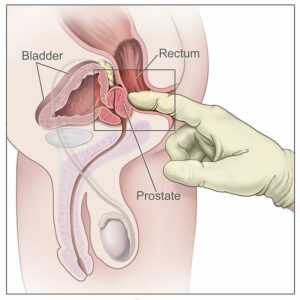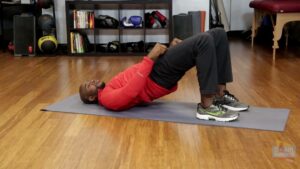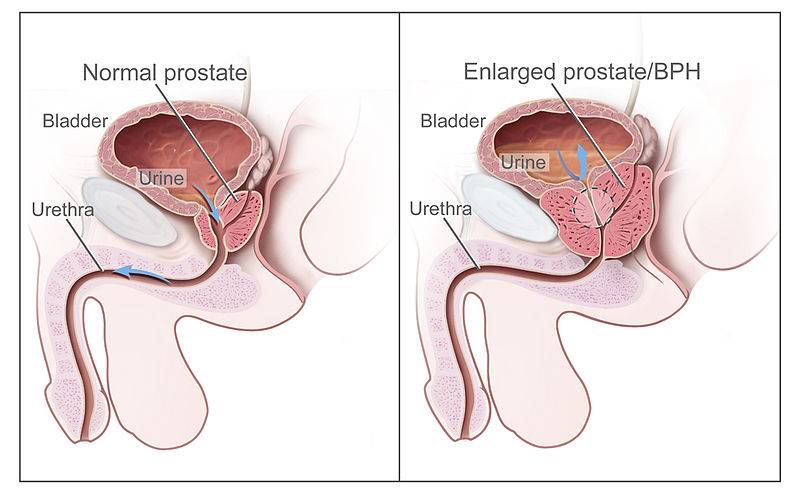Prostate discomfort is a common problem for men, and it can be very uncomfortable. Unfortunately, many men don’t know what is causing their discomfort, and they don’t know how to fix it. In this blog post, we will discuss the causes of prostate discomfort and the steps that you can take to alleviate the pain.
Contents
What Is Prostate Discomfort?
 Prostate discomfort is a common problem for men over the age of 50. It is often described as a feeling of pressure or pain in the lower abdomen, groin, or perineum (the area between the anus and scrotum). Many men experience some degree of intermittent or continuous pain in their prostate, which is generally caused by an increase in urinary flow. It displays the most common UTI symptoms and more can be present too.
Prostate discomfort is a common problem for men over the age of 50. It is often described as a feeling of pressure or pain in the lower abdomen, groin, or perineum (the area between the anus and scrotum). Many men experience some degree of intermittent or continuous pain in their prostate, which is generally caused by an increase in urinary flow. It displays the most common UTI symptoms and more can be present too.
There are three most common types of prostate discomfort, these include:
- Acute bacterial prostatitis is an active infection that manifests as fever/chills, back discomfort, lower back pain, trouble urinating, and an inability to completely empty the bladder. Testing has revealed the presence of germs in the urine. Although it’s less often, this kind can be pretty severe.
- Chronic bacterial prostatitis will present with recurrent urinary tract infections (UTI), and symptoms of the previous type stated above that can be constant or intermittent in nature over a period of three months. If the symptoms are sporadic, they must have persisted for three of the previous six months in order to be deemed chronic.
- Rectal, pubic, scrotal, tailbone, groin, lower back, and/or penile discomfort are symptoms of chronic prostatitis/chronic pelvic pain syndrome, as well as pain before, during, or after ejaculation. Urine tests negative for germs. 90% of prostatitis instances are of this type, which is the most prevalent of the three.
If you’re experiencing any type of prostate discomfort, it’s important to see a doctor. Depending on the specific symptoms, your doctor may recommend a variety of different treatments, including antibiotics or surgery.
Why Do People Feel Prostate Discomfort When Sitting?
There might be several reasons why you might be feeling discomfort when sitting. These include:
- One possibility is that your prostate is inflamed or swollen, which can lead to pain and difficulty passing urine.
- Another possibility is that you have a urethra obstruction, which can cause difficulty urinating.
- Third, the reason for your discomfort could be that you are not used to sitting for extended periods of time.
In addition, there are many possible causes of prostate discomfort, but the root cause is usually a combination of factors including genetics and age. Age can lead to changes in the prostate gland and surrounding tissues, creating pain or difficulty urinating. Other causes of prostate discomfort include:
- A blockage in the urinary tract caused by a stone, a piece of tissue, or an object
- A tumor or mass in the prostate gland
- Problems with ejaculation (e.g. low sperm count)
So, you can see there could be many possibilities that you might be feeling prostate discomfort when sitting. If you are having severe issues, then you should see a doctor to determine the cause and make any necessary adjustments to your treatment.
How To Manage Prostate Discomfort When Sitting?
 If you are suffering from prostate discomfort when sitting, there are a few things that you can do to help ease the pain. Some of these things include:
If you are suffering from prostate discomfort when sitting, there are a few things that you can do to help ease the pain. Some of these things include:
Take frequent breaks
This is one of the most important things that you can do if you are suffering from prostate discomfort when sitting. Taking frequent breaks will help to ease the pressure on your prostate and will also allow your body to rest. Because the prostate is located in the pelvis, sitting for long periods of time can put a lot of pressure on this sensitive area. Taking breaks every 20 minutes or so will help to relieve this pressure and will also give your body a chance to recover from the discomfort.
Wear loose-fitting cloths
This is an important one. Wearing tight-fitting clothing, such as tight jeans or underwear, can put extra pressure on the prostate and cause discomfort. Instead, opt for looser-fitting options that won’t put as much pressure on the area. Also, if you have a desk job or spend a lot of time sitting, take regular breaks to move around and stretch.
Some men find that placing a small, rolled-up towel under their buttocks helps them to feel more comfortable. For example, you might try sitting on an exercise ball instead of a chair.
Do pelvic floor exercises
 To strengthen your pelvic floor muscles, which support your bladder and help control urination, do Kegel exercises. To do these exercises:
To strengthen your pelvic floor muscles, which support your bladder and help control urination, do Kegel exercises. To do these exercises:
- Tighten the muscles you use to stop the flow of urine. Hold the contraction for three to five seconds, then relax for three to five seconds. Repeat 10 times. Try to do this exercise three to four times a day.
- Place your fingers on your pelvic floor muscles and imagine you are trying to stop passing gas. The muscles you use are the ones you need to strengthen.
- As you get better at doing these exercises, you can increase the number of seconds you hold each contraction. You should eventually work up to 10-second contractions with a 10-second rest period in between.
Change your diet
You may be able to reduce your symptoms by making dietary changes, such as:
- Eat foods that are high in fiber, such as fruits, vegetables, and whole grains.
- Avoid foods that are high in fat, such as fried foods.
- Limit caffeine and alcohol consumption.
- Drink plenty of fluids, especially water.
Try OTC medications
There are several over-the-counter medications that may help relieve your symptoms, such as:
- Alpha-blockers. These medications relax the muscles in your prostate and bladder neck, making it easier to urinate.
- 5-alpha reductase inhibitors. These medications shrink your prostate by blocking the hormone that promotes its growth.
Herbal supplements
It is believed that some herbal supplements can help with urinary symptoms associated with an enlarged prostate. These supplements include:
- Saw palmetto. This supplement is made from the berries of the saw palmetto tree. It is thought to block the hormone that promotes prostate growth.
- Pygeum. This supplement is made from the bark of an African plum tree. It is thought to help with urinary symptoms and sexual function.
- Stinging nettle. This supplement is made from the root of the stinging nettle plant. It is thought to block the hormone that promotes prostate growth and helps with urinary symptoms.
- Zinc. This mineral is found in many foods, such as meat, poultry, seafood, beans, and nuts. It is thought to help with sexual function and urinary symptoms.
Talk to your doctor before taking any supplements, as they can interact with medications you may be taking.
Strengthening exercises
 There are some common strengthening exercises for prostate discomfort when sitting that you can do at home.
There are some common strengthening exercises for prostate discomfort when sitting that you can do at home.
- Manual therapies: This is a type of self-massage that can help to relieve discomfort. These therapies are also helpful in releasing the tension around the pelvic region and lower back.
- Hip strengthening and mobility exercises: These exercises help to improve the range of motion in the hips and also help to strengthen the muscles around the pelvis. This can reduce the pressure on the prostate and alleviate discomfort.
- Postural strengthening exercises: It is more likely that you will experience discomfort when sitting if you have poor posture.
Overall, these are just a few treatment options that can help to reduce prostate discomfort when sitting. It is important to consult with your doctor before beginning any new exercise or treatment program. With the right treatment option, you can find relief and improve your quality of life.
Conclusion
In conclusion, prostate discomfort when sitting can be a symptom of an underlying condition, such as prostatitis or an enlarged prostate. If you are experiencing this symptom, it is important to see your doctor to determine the cause and get appropriate treatment. This can be a sign of a serious condition, so do not ignore it.
Physical therapy can be vital in the management of chronic prostate discomfort. A pelvic floor physical therapist can help to assess and treat the muscles and tissues that may be contributing to your symptoms. If you are experiencing prostate discomfort when sitting, talk to your doctor about a referral to a pelvic floor physical therapist.
Physical Therapy has always been proven to help patients recover from pain. Hence, if you’re experiencing Back pain, Shoulder pain, Knee pain, Neck pain, Elbow pain, Hip pain, or Arthritis pain, a physical therapist at MantraCare can help: Book a physiotherapy session.


